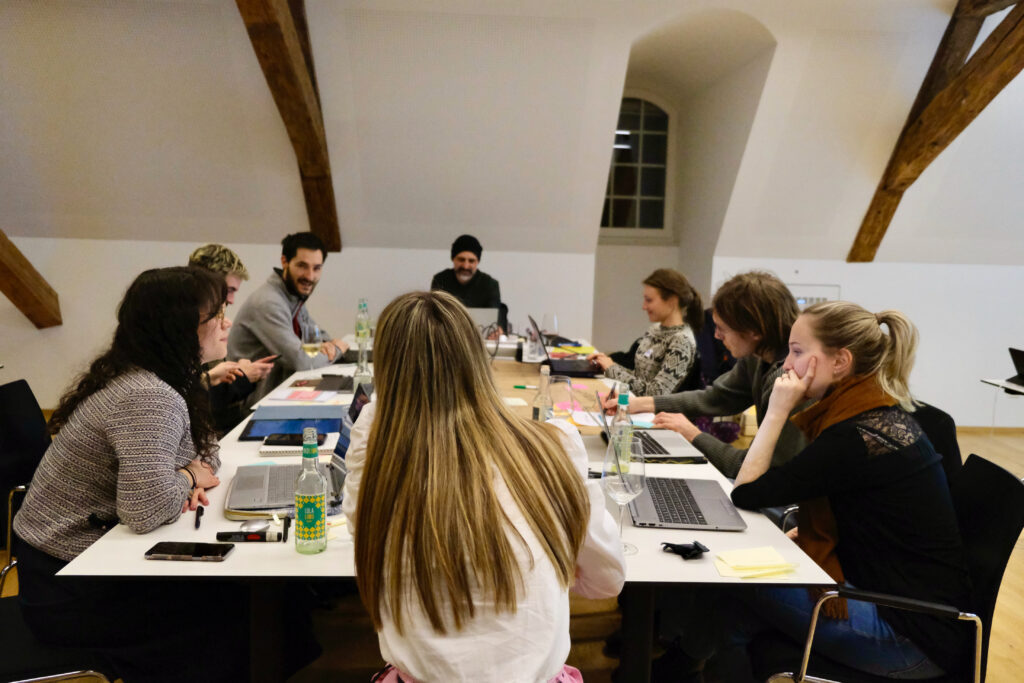This is the second of two blog posts created with masters students of Swiss Universities of Applied Sciences from a variety of academic fields receiving the Hirschmann foundation scholarship. The goal for the young group of future decision-makers was to develop creative solutions and innovative outputs on how to tackle the challenges facing direct democracy today.
Authors: Sahara Azzeg, Jonas Bernetta, Sébastien Gilliand, Gatien Leray, Kylian Maître, Engy Mohsen, Nicola Robinson, Luisa Christina Vaas, Lorraine van Nijen
In Switzerland, direct democracy grants its population extensive political participation rights: democracy is designed to provide justice and freedom to citizens and to ensure that diverse perspectives are heard and considered in decision-making processes. In times of crisis, it is our responsibility as a society to fight for this precious gift of living in democracy. Nevertheless, a worrying trend is emerging: the low levels of voting participation among young people. While democracy relies on citizen engagement, data from the 2019 Swiss parliamentary elections shows a generational divide in participation: only 33% of adults below the age of 25 made use of their right to vote, while the participation rate in the 65 to 74 age bracket was almost double.
A worrying trend that is emerging all across Europe is the growing mistrust towards the democratic system and established political institutions among the youth. In Switzerland, young voters perceive the system as opaque and unresponsive as they find political language too complex, do not exhibit high levels of trust in politicians, and feel that their individual vote does not suffice to change large issues. A recent study showed that there is a lack of understanding among young citizens of the Swiss political system and its mechanics as well as an inability to cope with the flood of information that is available. Although political education at school is considered the best incentive to tackle this problem and engage more in votes, the subject is taught at most once a week alongside civic education, and largely differs in content between cantons. This weakness of the public educational system thus further undermines young citizens’ capacity to participate in democracy in an informed way.
Consequences of Dysfunctions for Swiss Democracy
A lack of engagement in votes and elections leads to an underrepresentation of young voters within traditional democratic institutions. Young people’s specific concerns and perspectives are therefore overlooked within the political system in favour of views held by older, more established political figures. This sense of exclusion intensifies younger people’s disconnection from some types of political decisions and contributes to a broader sense of disenchantment about voting.
This does, however, not mean that young people have no intrinsic desires for political change and political passion. Their underrepresentation in relevant institutions, mistrust in political actors and systems, as well as doubts about the weight of their vote lead young people more towards other forms of civic involvement. Swiss youth are increasingly opting for direct and impactful forms of engagement, such as activism and protests movements like Fridays for Future or Black Lives Matter.
Possible Measures to Enhance Youth Engagement and Strengthen Democratic Processes
One possibility to address the key issues mentioned above is to improve understanding of the political system at a young age already. Kids and teenagers should regularly experience debate, negotiation and the exchange of their ideas. Thought exchange can take place in a classroom, at a regional event, or also in national or international forums. Specific measures include incorporating structured debates and mock elections in school programs to familiarise students with political processes. As a first step, schools need to create a supportive framework that provides a safe space for students to express their opinions and gain practical political know-how. In 2007, Austria became the first European country adopting a voting age of 16 and saw a marked increase in youth voter turnout. This measure could also prove beneficial in Switzerland, as needing to be of the age of 18 to partake in votes and elections is a barrier to the institutional democratic participation of many Swiss teenagers.
Another way to engage young people in voting could be to fill the void between politicians and youth. Bringing a closer proximity between those who feel their voice does not matter and those who make decisions could help re-establish trust in politicians and confidence in the benefits of our system. An example for such a measure on a regional level is hosting local town halls where young people can interact with local politicians and community leaders. On a national or international level, facilitating initiatives such as Model United Nations or youth parliaments where teenagers can immerse themselves in larger-scale political discussions is to be encouraged. To achieve these objectives and ensure effective implementation, political decision-makers should establish an annual Youth Education Day, exclusively dedicated to organizing various education projects and activities for students to interact with politicians.
Voting starts with a desire to give a voice for a vision of the future. We all are responsible for reinforcing that desire for future generations, so that democracy’s heart will be stronger and more resilient. It is up to the institutions to work to strengthen young people’s commitment to democratic life.








